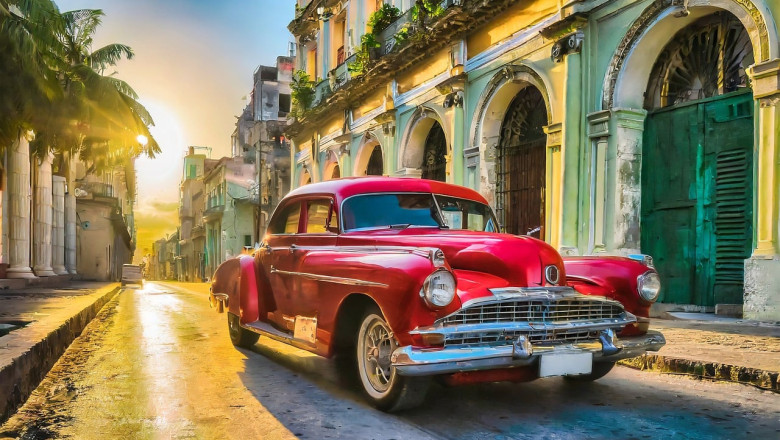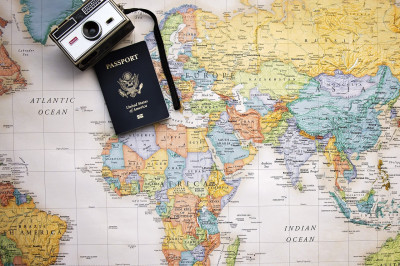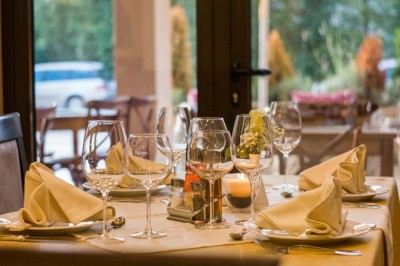Family-Friendly Cuba: Tourism Tips for Traveling with KidsIntroduction to Family Travel in Cuba
Cuba, with its rich history, vibrant culture, and warm, welcoming locals, offers a unique destination for family travel. The island is not only picturesque but also packed with activities that cater to both adults and children, making it an ideal choice for a family vacation.
Why Choose Cuba for Family Travel
Cuba's appeal as a family-friendly destination lies in its diverse attractions that engage all age groups. From its pristine beaches and lush landscapes to its colorful streets lined with historical architecture, the country provides a backdrop for both relaxation and educational experiences. The safety of the country is also a significant factor; Cuba is known for its low crime rates and friendly atmosphere, which makes it comfortable for families traveling with young children.
What to Expect When Traveling with Kids in Cuba
Traveling to Cuba with kids offers a chance to expose them to a different culture and lifestyle. However, it's important to manage expectations as the country's infrastructure and resources can be quite different from what many Western tourists are accustomed to. Internet access can be limited, and while major cities like Havana and Varadero are well-equipped to cater to tourists, smaller towns may offer fewer amenities.
Cultural Experiences for Kids
Cuba offers a plethora of activities that can help children learn and engage with the culture. Dance and music are integral parts of Cuban life, and many towns have schools or workshops where kids can learn salsa or traditional Cuban music. Visiting local markets and farms can also provide a hands-on learning experience about local foods and crafts.
Outdoor Activities
For families that love nature and the outdoors, Cuba's varied landscape provides numerous opportunities for exploration. Snorkeling in the clear waters of the Caribbean, hiking in the Viñales Valley, or bird watching in the Zapata Swamp are just a few activities that can be enjoyed by the whole family. Beaches like Varadero and Playa Paraiso offer safe and clean spots for children to play and swim.
Educational Opportunities
Cuba's rich history is visible in its well-preserved colonial cities and museums. Educational tours through places like Old Havana, the Che Guevara Mausoleum in Santa Clara, or the Castillo del Morro in Santiago de Cuba can provide insightful experiences for older children and teenagers. Many of these sites offer guided tours in English, which can help make the historical contexts more accessible to young visitors.
Practical Tips for Family Travel in Cuba
When planning a trip to Cuba with children, it's crucial to consider the logistics. Booking accommodations that cater to families, such as resorts known for their child-friendly facilities and services, can make the stay more comfortable. It's also advisable to pack essentials such as medications, snacks, and sun protection, as these items might not be readily available or could be expensive to purchase locally.
Traveling around the island might require a bit of planning as well. While rental cars and taxis are available, the conditions of some roads and the general standard of driving can be challenging. Public transportation options like buses are available but may not always be reliable or comfortable for young children.
By preparing adequately and choosing the right activities, Cuba can be a delightful and enriching destination for a family vacation, offering a blend of educational, cultural, and recreational activities that cater to all ages.
Best Time to Visit Cuba with KidsWeather Considerations
Cuba has a tropical climate with two main seasons: the wet season and the dry season. The dry season, from November to April, is generally considered the best time to visit, especially for families. During these months, the weather is cooler and less humid, making it more comfortable for outdoor activities with children. The temperatures typically range from 70°F to 82°F (21°C to 28°C), which is ideal for exploring the cities, beaches, and natural attractions without the discomfort of excessive heat.
Crowds and Pricing
Visiting during the dry season also coincides with the peak tourist period. While this means that some attractions can be more crowded, it also ensures that all tourist facilities, such as restaurants, museums, and special events, are fully operational. This can be particularly beneficial when traveling with kids, as you'll have more options to keep them entertained. However, it's important to note that prices for accommodation and flights may be higher during this peak time. Planning and booking in advance can help manage costs and ensure availability.
School Holidays
Aligning your trip with school holidays can be a strategic choice when traveling with children. The Christmas and Easter holidays are popular times for family travel. During these periods, you might find special events and festivities in Cuba, such as parades, festivals, and public celebrations, which can provide unique cultural experiences for children. However, be prepared for larger crowds and book your accommodations and activities well in advance.
Considerations for the Wet Season
The wet season, from May to October, sees higher temperatures and increased humidity, along with frequent rain showers, particularly in the afternoons. While this season is less ideal for sightseeing, it offers lower prices and fewer tourists, which might appeal to families looking to avoid the crowds and save on travel expenses. If considering travel during this period, it's advisable to plan indoor activities during the rainier parts of the day and to always have a backup plan.
Health and Comfort
Regardless of when you decide to visit, ensuring the health and comfort of your children is paramount. Pack appropriate clothing for the season, and always bring essentials such as sunscreen, hats, and insect repellent to protect against the sun and mosquitoes. Staying hydrated is crucial, especially when touring outdoor sites or spending time on the beach.
Kid-Friendly Attractions in CubaHavanaLa Maqueta de la Habana Vieja
This detailed scale model of Old Havana offers children a unique bird's-eye view of the city, making it easier for them to grasp the layout and historical architecture. Interactive elements allow kids to engage more deeply with the exhibit, learning about the city's development and landmarks.
Parque Almendares
A natural escape within the city, Parque Almendares is perfect for families. It features picnic areas, a miniature golf course, and paddle boats, which are great for kids who enjoy active outdoor activities.
Acuario Nacional de Cuba
Situated in the Miramar area of Havana, this aquarium is a hit with children fascinated by marine life. It showcases a variety of sea creatures native to Cuban waters and offers dolphin shows that captivate audiences of all ages.
VaraderoParque Josone
This park is a serene oasis ideal for families. With its lush gardens, small lake, and paddle boats, it provides a relaxing environment. Children can enjoy the playgrounds and feed the ducks, making it a perfect spot for a family picnic.
Varadero Beach
Known for its crystal-clear waters and soft white sands, Varadero Beach is a must-visit for families. The shallow waters make it safe for children to swim, and various water sports are available for older kids.
TrinidadParque Cespedes
Located in the heart of Trinidad, this park is surrounded by colorful colonial architecture and is often filled with music. It's a great spot for kids to run around and soak up the local culture.
Playa Ancon
Just a short drive from Trinidad, Playa Ancon offers a quieter beach experience. The gentle waves and snorkeling opportunities provide plenty of entertainment for families with children.
Santiago de CubaGran Piedra
For adventurous families, a hike up to La Gran Piedra offers rewarding views and a chance to explore the local flora and fauna. The climb is manageable for older children, and the cool mountain air provides a refreshing break from the city heat.
Castillo del Morro
This historical fortress not only offers fascinating military history but also panoramic views of the sea. Kids will enjoy exploring the old cannons and ramparts, and the pirate lore associated with the castle adds an element of excitement to the visit.
CamagüeyParque Ignacio Agramonte
This large park in the center of Camagüey is equipped with playgrounds and plenty of space for children to play. It's a popular spot for local families, giving visitors a chance to mingle and experience everyday Cuban life.
Galería Martha Jiménez
Located near the Plaza del Carmen, this gallery features whimsical sculptures and artworks that are often playful and engaging for children. The outdoor sculptures of oversized cats are particularly popular among younger visitors.
HolguínParque Calixto García
A central spot in Holguín, this park is filled with life and local culture. Families can enjoy leisurely walks, watch street performances, and let their children play among the many statues and fountains.
Playa Pesquero
Ideal for families, Playa Pesquero boasts fine sand and calm waters. The beach is well-equipped with amenities, making it easy for parents to relax while children play safely nearby.
Family-Friendly AccommodationsTypes of Accommodations Suitable for Families
When traveling to Cuba with children, selecting the right type of accommodation is crucial for a comfortable stay. Families typically look for places that not only provide comfort but also ensure safety and entertainment for children.
Hotels
Many hotels in Cuba are geared towards families, offering spacious rooms or interconnected rooms that allow parents to maintain privacy while keeping children close. These hotels often feature child-friendly amenities such as swimming pools with shallow ends, kids’ clubs, and special meal options catering to younger guests.
Resorts
Resorts are an excellent choice for families seeking an all-inclusive experience. They usually offer a range of activities designed to keep children entertained, from craft workshops and dance lessons to water sports and organized games. Resorts also often include services like babysitting, allowing parents to take some time for themselves.
Casas Particulares
For a more authentic Cuban experience, families can opt for casas particulares, which are private homes licensed to offer guest accommodations. Staying in a casa particular allows families to immerse themselves in Cuban culture. Many casas are welcoming to families and can provide homemade meals suited to children’s tastes and dietary needs.
Key Features to Look for in Family-Friendly Accommodations
When booking accommodations in Cuba, there are several key features that families should consider to ensure a pleasant and hassle-free stay.
Kid-Friendly Amenities
Look for accommodations that offer specific amenities for children, such as cribs, high chairs, and children’s television channels. Some places also provide essentials like bottle warmers and strollers upon request.
Safety Features
Safety is a paramount concern when traveling with children. Check for accommodations that offer secure windows and doors, covered electrical outlets, and the absence of small, easily swallowed items. Pools should have lifeguards on duty, and public areas should be well-lit and monitored.
Location
Choosing accommodations located near family-friendly attractions can minimize travel time and make the trip more enjoyable. Proximity to beaches, parks, and museums will keep travel routes short and the children engaged.
Family-Oriented Services
Some accommodations go the extra mile in catering to families by offering services such as laundry, which can be a boon on longer trips. On-site dining options that cater to various dietary needs and preferences can also make a significant difference in the convenience of a family vacation.
Popular Family-Friendly Accommodations in CubaVaradero
Varadero is known for its all-inclusive resorts with extensive programs for children and beautiful beachfronts. Resorts like Iberostar Bella Vista and Meliá Peninsula Varadero are popular among families for their child-friendly facilities and activities.
Havana
In Havana, families can enjoy the cultural richness of the city while staying in accommodations like Hotel Nacional de Cuba, which offers a taste of history along with modern comforts suited for families.
Trinidad
For a quieter, culturally rich experience, Trinidad offers several casas particulares that are perfect for families. These accommodations provide a cozy, home-like atmosphere and are close to Trinidad’s scenic historical sites.
By choosing the right accommodation, families can ensure a comfortable, enjoyable, and memorable visit to Cuba.
Eating Out in Cuba with ChildrenChoosing the Right Restaurants
When traveling with children in Cuba, selecting the right restaurant can make dining out a pleasant experience for the whole family. Look for family-friendly establishments that offer a casual dining atmosphere. Many restaurants in Cuba, especially in tourist areas like Havana and Varadero, are accustomed to accommodating families with children. These places often have a more relaxed vibe, which can be less stressful for parents.
Kid-Friendly Menus
Cuban cuisine typically includes rice, beans, plantains, and meats such as pork and chicken. While these can be appealing to kids, it's useful to know that many restaurants also offer specific kid-friendly dishes. For instance, simple grilled chicken, hamburgers, or sandwiches are commonly available and can be a safe choice for picky eaters. Some restaurants might also offer smaller portions or a children's menu, which includes familiar items like spaghetti or pizza.
Dietary Restrictions and Allergies
If your child has specific dietary restrictions or allergies, it's important to communicate these clearly to the restaurant staff. While Cuban cuisine generally uses fresh ingredients and simple cooking methods, it's always best to discuss any dietary needs directly with the server or chef. Keep in mind that not all restaurant staff may be fluent in English, so having a few key phrases in Spanish or a translation app can be very helpful.
Timing Your Meals
Cubans typically eat dinner later in the evening, often starting around 8 PM or later. For families with young children, this might be challenging. Try to plan your meals earlier in the evening, or opt for a substantial late afternoon snack to keep the kids happy until dinner. Some restaurants, particularly in tourist areas, may be open earlier to accommodate international dining schedules.
Entertainment and Amenities
To enhance the dining experience for both children and adults, look for restaurants that offer some form of entertainment or amenities for kids. This could include play areas, coloring books, or even live music that can keep the entire family entertained. Some establishments might also have outdoor seating areas where kids can move around more freely without disturbing other diners.
Practical Tips for Dining Out
- Always carry essential items such as baby wipes, small toys, and snacks to keep your children occupied while waiting for food.
- Consider the restaurant's location and ease of access with strollers or for little ones who may tire easily.
- Be aware of the local water safety; it's advisable to order bottled water for drinking and brushing teeth, especially for young children, to avoid any health issues.
By keeping these points in mind, eating out with children in Cuba can be a delightful part of your travel experience, offering both delicious food and a warm, welcoming atmosphere.
Tips for Safe and Healthy Travel in CubaHealth PrecautionsVaccinations
Before traveling to Cuba with children, ensure that all routine vaccinations are up-to-date according to your home country’s guidelines. It is advisable to consult with a travel health clinic or your family doctor about specific vaccinations recommended for Cuba, such as Hepatitis A and Typhoid, which are often suggested due to their transmission through food and water.
Food and Water Safety
To avoid stomach illnesses, which can quickly ruin a family vacation, be cautious with food and water intake. Stick to bottled water for drinking and brushing teeth, and avoid ice cubes or tap water. When eating out, choose restaurants that are busy and have a high turnover of food to ensure freshness. Be wary of street food, which can be risky in terms of hygiene.
Sun and Heat Protection
Cuba's tropical climate calls for adequate sun protection to prevent sunburns, especially for children who may be more sensitive. Use a high-SPF sunscreen, reapplying every two hours or after swimming. Hats, sunglasses, and lightweight long-sleeve clothing can also help protect against the sun. Keep hydrated by drinking plenty of fluids, particularly water, throughout the day.
Safety GuidelinesTransportation Safety
When traveling around Cuba, always use official taxis or arrange transportation through your accommodation. Verify that any car seats for children comply with safety standards and are properly installed. For longer journeys, consider bringing your own car seats from home to ensure safety and comfort.
Avoiding Insect Bites
Mosquito-borne diseases like Zika, Dengue, and Chikungunya are present in Cuba. Protect your family by using insect repellent recommended for children and covering up with clothing during dawn and dusk when mosquitoes are most active. Consider treating clothes with permethrin and using mosquito nets over beds if staying in accommodations that are open to the outdoors.
Water Safety
If your travel plans include swimming, always keep a close watch on children and choose swimming spots wisely. Avoid rivers and lakes where water quality can be questionable and opt for well-maintained pools or clear, calm beaches. Check for any safety signs or flags that indicate current water conditions and adhere to local advice.
Healthcare AccessKnowing Where to Go
Familiarize yourself with the locations of clinics and hospitals near where you will be staying. Cuba has a good healthcare system, but facilities may vary in quality, especially outside of major cities. Consider travel health insurance that covers medical treatment abroad and ensures that it includes coverage for children.
Pharmacy Preparedness
Pack a travel health kit with essential medications and first aid supplies, as pharmacies in Cuba may not always stock everything you need. Include items like pain relievers, antihistamines, antidiarrheal medications, and band-aids. Check the legality and availability of specific medications in Cuba before your trip.
By following these tips, you can help ensure a safe and healthy travel experience for your family in Cuba.
Cultural Experiences for KidsInteractive Music and Dance Workshops
Cuba's rich musical heritage offers a unique opportunity for children to engage with the culture through interactive music and dance workshops. These workshops, often available in cultural centers or through tour operators, teach children the basics of Cuban rhythms such as salsa, rumba, and son. Not only do they get to learn about the instruments and dance moves, but they also participate in live sessions with local musicians and dancers, making it a fun and educational experience.
Visit to a Local School
Organizing a visit to a local school can provide an insightful peek into the daily lives of Cuban children. Such visits allow for cultural exchange between visiting kids and their Cuban counterparts. Activities might include joint art projects, sports, or simply sharing stories about their respective cultures. This experience helps in fostering global awareness and friendship among young travelers.
Storytelling Sessions
Cuba has a strong tradition of storytelling, with a rich history that is often passed down through generations orally. Attending a storytelling session can be a captivating experience for children, where local storytellers enchant them with tales of Cuban folklore and legends, often accompanied by traditional music or puppetry.
Art and Craft Workshops
Participating in art and craft workshops allows children to express their creativity while learning about Cuban artistic styles and techniques. These workshops might include pottery making, painting, or creating traditional Cuban crafts like papier-mâché masks. Such activities not only keep the children engaged but also give them a tangible memory of their trip to take home.
Cooking Classes
Cuban cuisine is a delightful exploration of flavors and techniques. Cooking classes designed for families can introduce children to simple, kid-friendly Cuban dishes. Under the guidance of local chefs, children can learn how to make items like tostones (fried plantains) or Cuban sandwiches, which provides a hands-on culinary experience and teaches them about the local food culture.
Historical Reenactments
Participating in or watching historical reenactments is a thrilling way for kids to learn about Cuba’s history. These are often held at significant historical sites and can include moments like the reenactment of battles or important historical events. It's an engaging way to bring history to life and provide context to the places they visit in Cuba.
Nature and Community Walks
Guided nature and community walks can be tailored to include cultural insights such as visits to local farms, plantations, or small villages. These walks often involve interactions with local communities, giving kids a chance to learn about rural Cuban life and the island's natural biodiversity. Guides typically share information about the local flora and fauna, as well as cultural practices related to agriculture and community living.
Making the Most of Your Family Trip to CubaEmbrace the Local Culture
Encourage your family to dive into the rich Cuban culture by participating in local activities and events. Engage with traditional music and dance, perhaps taking a family salsa class. Visit community art projects and local markets where kids can interact with artisans and learn about Cuban crafts. This hands-on approach not only entertains but also educates your children about the world beyond their familiar surroundings.
Plan for Relaxation and Adventure
Balance your itinerary between relaxation and adventure. Cuba offers beautiful beaches where families can unwind and play in the sand. For a change of pace, consider eco-tours in places like Viñales Valley or the Zapata Peninsula, where you can explore caves, watch birds, and hike through stunning landscapes. Such activities provide fun learning opportunities for kids about nature and conservation.
Choose Kid-Friendly Accommodations
Select accommodations that cater to families. Many hotels and resorts in Cuba offer amenities like swimming pools, kid’s clubs, and family-oriented entertainment. Staying at a place that welcomes children with appropriate facilities can make your stay more comfortable and enjoyable for everyone.
Savor the Local Cuisine
Introduce your children to Cuban cuisine, which is both delicious and a vital part of the travel experience. Many Cuban dishes are kid-friendly, such as rice and beans, grilled meats, and tropical fruits. Look for restaurants that offer a casual dining atmosphere, which can be less stressful for families with young children.
Use Local Transportation Wisely
When traveling around Cuba, consider using a variety of transportation methods that can also be part of the adventure. Classic car tours are a hit among kids and adults alike. For longer distances, the Viazul buses are equipped with air conditioning and are a reliable way to travel between cities. Always plan extra time for travel to keep the journey relaxed and enjoyable.
Keep Safety in Mind
Always prioritize safety during your travels. Bring along a first-aid kit, ensure you have access to clean drinking water, and use sunscreen regularly. Familiarize yourself with the locations of medical facilities in case of an emergency. By being prepared, you can ensure that your family’s health and safety are taken care of, allowing you to focus on enjoying your trip.
Connect with Other Traveling Families
Look for opportunities to connect with other families who are also exploring Cuba. This can provide your children with playmates and give you a chance to exchange tips and ideas with other parents. Social media groups and forums can be great resources for finding family-friendly activities and accommodations recommended by like-minded travelers.
By following these tips, your family can fully enjoy the unique experiences that Cuba has to offer, creating lasting memories together.



































